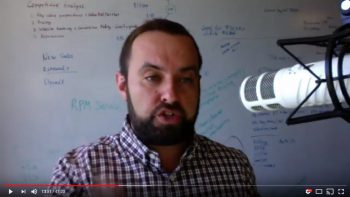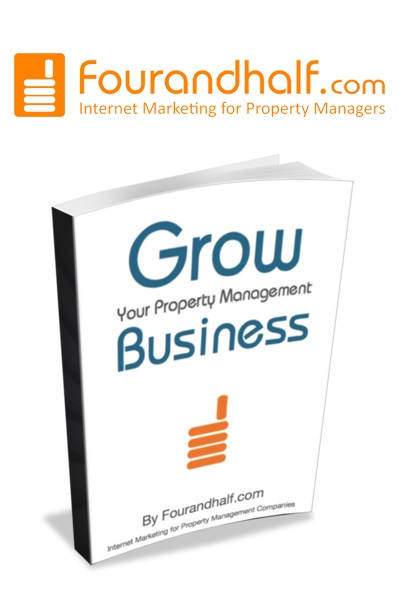FREE Built to Grow Subscription
Unsubscribe anytime
Request an Appointment with Robert
Adopting a Formula for a Nickel-and-Dime Business
There’s an important formula that you need.
Here’s the truth: Property management is a nickel-and-dime business. You’re not chasing $5,000 checks. You’re chasing $80 dollars a month from your clients.
All nickel-and-dime businesses require volume.
To create volume, you need speed.
What does speed look like?
It’s approving applications without calling the owner. It’s handling maintenance under $500 without collaborating with the owner. Those things create speed. Processing an application and signing the lease without the owner and moving the tenant in on your own creates speed, which creates volume.
You need speed for scalability. If you have to collaborate with your owners, you defeat speed and you can’t scale.
When you’re collaborating with owners, you’re driving a motor home that’s clunky, slow, and guzzling gas.
When you let that go, you can drive a Ferrari, which is fast, racy, and efficient.
If your owners hate it, they can let you go. And that will be okay.
Educating Your Owners Starts with the Management Agreement
If you’re constantly blogging and communicating with your owners through newsletters and other methods of communication, you’re going to be able to set the expectations and earn the trust you need to follow this formula and claim your authority as the property management professional.
The process of owner education starts with the management agreement.
Build a management agreement that isn’t sluggish and slow. Have the right language that tells owners they can trust you to make good judgments.
Owners don’t know what’s going to be in a management agreement. They do not spread out three different management agreements and see how others do it. If your contract sounds logical and intelligent, they will sign it.
Growth Strategies: Remote Lockboxes and Outsourcing
If you want to grow, you need to stop meeting your tenants at the property to move them in. Once you get to a certain level, it becomes chaos and takes up too much time.
Remote move-ins are easy and efficient.
Let go of the personal move-in process and set up a system where you can send the lease via DocuSign and tenants can go onto their portal to pay the rent and the security deposit. You cannot scan them a key, but you can create a lockbox mechanism that’s controlled remotely.
If you think you have to be there when they move in, you’re not thinking about speed, and you won’t be able to grow.
Remote showings are also essential. You don’t actually need to have an agent there to show prospective tenants which room is the living room and which room is the kitchen. They can take a look around themselves and contact you with any questions.
Society today is becoming less personal. There’s a tension there, and it’s easy to worry about losing the personal relationship with prospective tenants. But, there are benefits. Think about fair housing. Remote showings will do a better job of keeping you compliant.
The personal relationship is important in the sales process. You’re showing off the home. It’s a big ticket item. With rentals, tenants don’t need you there to help them make their decision.
Some property managers really want to keep their process personal. They want to shake hands and fawn over the kids and pet the dog. This is fine if you want to stay small and have relationships. It’s just not scalable, and you won’t be able to grow past a certain point.
Outsourcing is the current catnip in the NARPM world. If you want to grow, embrace outsourcing.Virtual assistants cost less and they get a lot of your administrative work done. They can handle phone calls and answer questions. This is critical not because it makes you more money but because it holds your costs down. It’s a critical element to becoming scalable and profitable.
Property Management Assets: Employees and Tenants
Virtual assistants allow your staff to play a more strategic role in servicing your owners and your clients. This is important because turnover – whether it’s employees or tenants – will kill your ability to grow.
You’ll make a lot more money from a tenant who is in the property for five or 10 or even 20 years. You’ll hear a lot of property managers say we work for the owner. But, if the tenant is happy, the owner is happy.
The longer you keep tenants, the longer you keep owners. Make sure your tenants are feeling valued, and make sure your management agreement doesn’t renew with the lease, but with the tenant’s departure.
There’s much more in Robert’s course that can help property management companies grow without growing pains. If you want to dig in deeper, check out his online workshop at: https://trainingpropertymanagers.com/online-courses
There is a button with courses that are both on-site and online. There’s even a series you can subscribe to that’s completely free and available to everyone.
Thanks to Robert for joining us, and thanks to all of you for listening.
View Our Expanding Line of Products
This is the part of our site where all the products, resources, videos, forms, manuals, handbooks, customized management agreements and leases, money-making ideas, CYA protections, checklists, service animal/comfort pet training and all you’ll ever need to run a safe and profitable management business. This is the “Mother Load”.
It will take us six to twelve months to get it all posted, and we’ll keep posting more as time goes on, but there will be more than you can digest before the end of the year. I’ve been digging through our 35 years of document archives and there’s more than I thought.
If you register we’ll send you notices as we post things so you’ll know what’s there and where to look for it.



















